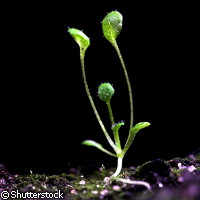Scientists shed light on plant defence quagmire
Plants put up a good fight against their enemies but there are differences both within and between species in how effective their defences are, new EU-funded research shows. The scientists, led by the Max Planck Institute for Developmental Biology in Germany, have discovered that while one plant may succumb to a bacterial infection, its neighbour will bloom rather successfully. However, disease resistance can come at a price. The study's findings are published in the journal Nature. This research is supported via 3 projects funded under the EU's Sixth Framework Programme (FP6): SY-STEM ('Systems biology of stem cell function in Arabidopsis thaliana (A. thaliana)'), which received EUR 2.43 million under the Marie Curie Research Training Networks (RTN) mobility scheme; AGRON-OMICS ('Arabidopsis growth network integrating OMICS technologies'), backed with EUR 12 million under the 'Life sciences, genomics and biotechnology for health' Thematic area; and ARABRAS ('Identifying relevant candidate genes for improving plant growth under abiotic stress conditions in Brassica crops'), supported with almost EUR 900,000 via the Plant Genomics ERA-NET (European Research Area Network). Plants defend themselves in myriad ways; they can develop thorns, generate foul smells, and even kick-start their immune systems to keep bacteria and viruses at bay. But the scientists have found that plants which can resist disease grow at a much slower pace and are more passive than their vulnerable relatives when not threatened by enemies, such as animals and microbes. For example, the hardy A. Thaliana - commonly known as mouse ear cress - produces only a few small leaves and becomes somewhat sluggish when enemies are absent. Together with his colleagues, Professor Detlef Weigel of the Department of Molecular Biology at the Max Planck Institute for Developmental Biology successfully identified a variant of the ACD6 (accelerated cell death 6) gene, which is a crucial player in the fight against predators. This gene gives plants the ammunition they need to survive. Specifically, the variant of the gene encourages plants to produce more substantial amounts of a lethal chemical that kills microbes, as well as signalling molecules that boost immunity. 'Using a combination of forward genetics and genome-wide association analyses, we demonstrate that allelic diversity at a single locus, ACD6, underpins marked pleiotropic differences in both vegetative growth and resistance to microbial infection and herbivory among natural A. thaliana strains,' the scientists write. According to their findings, a hyperactive ACD6 allele (an alternative form of a gene located at a specific position on a specific chromosome) enhances resistance to various plant pathogens, but also decelerates the production of new leaves and reduces the biomass of mature leaves. 'We could show that this gene makes plants resistant against pathogens, but at the same time it slows down the production of leaves and limits the size of leaves, so that these plants are always smaller than those that do not have this variant,' co-author Professor Weigel explained. 'But as soon as they are being attacked, the plants with the special ACD6 variant have a leg up compared to plants with the standard version. On the down side, at places or in years where there are few enemies, they are penalised and lose out compared to the larger fellow plants. The scientists said that smaller plants produce fewer seeds, eventually resulting in fewer progeny. 'Just as in human society, there is no free lunch in nature,' Professor Weigel concluded.' Also participating in this study are researchers from Australia, Austria, Germany, the UK and the US.
Countries
Austria, Australia, Germany, United Kingdom, United States



